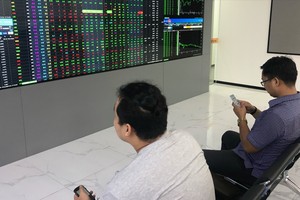Resolution No. 68-NQ/TW outlines the target to achieve by 2030, which includes reaching a total of 2 million enterprises, with the private economy as the primary driving force of the national economy.

The private sector is expected to lead in the advancement of science, technology, innovation, and digital transformation, aiming for an average annual growth rate of approximately 10 percent to 12 percent; thereby contributing around 55 percent to 58 percent of the GDP. These objectives are regarded as strategic visionary goals.
Over the span of almost 40 years of development, Vietnam's private economy has demonstrated remarkable progress across various domains, emerging as a pivotal force in wealth creation and material development, while actively contributing to economic growth and national advancement. At present, the private economic sector comprises nearly 1 million enterprises and over 5.5 million business households.
Vietnam has large economic groups, the first Vietnamese billionaires and many Vietnamese brands recognized by the world such as Vinamilk, VinGroup, FPT, Truong Hai, Hoa Phat.
Private enterprises have successfully participated in important infrastructure breakthrough projects such as highways, large road tunnels, and international airports. The first large-scale automobile manufacturing projects in Vietnam were also undertaken by private enterprises.
Private sector participation has expanded across numerous economic domains, including traditionally state-dominated sectors such as airports, seaports, transport infrastructure, aviation, electricity, healthcare, education, sports, cinema, and notary services.
Up to now, the private economic sector has developed spontaneously with a lacking of a comprehensive development strategy that focuses on strategic sectors and key industries. In addition, numerous challenges, obstacles, and bottlenecks have impeded the growth rate of this sector.
The Vietnamese private sector has consistently demonstrated resilience and dynamism—even during periods of prohibition or discrimination. Its entrepreneurial spirit endured, most notably through the household business model. Today, the context has shifted significantly. The private sector is now supported, encouraged, and actively promoted.
In practice, the involvement of the private sector typically results in beneficial changes. Its engagement frequently enhances technology, product quality, and service excellence. Amid a conducive development environment, Vietnamese businesses are well-positioned to progress and compete on par with international counterparts.
The role of private enterprises in all countries is very important, taking on many important functions. Looking internationally, South Korea and Taiwan (China) are two prominent models that Vietnam can learn from on the path of private economic development.
Nonetheless, a common factor in the success stories of those fostering the growth of the private economy is the proactive involvement of the government. They have strategically selected key industries that receive substantial and sustained state backing. Furthermore, they have implemented robust trade promotion strategies and established substantial investment promotion funds.
The private economy is increasingly viewed as a pioneering force in driving the country’s industrialization and modernization, contributing to the vision of a prosperous, dynamic, and globally integrated Vietnam. To realize this aspirational vision, the most critical factor is to continue pursuing bold institutional, policy, and regulatory reforms that enable the private sector to unlock its full potential. At the same time, proactive leadership from the government remains essential.
Numerous support policies and solutions have been suggested, yet they primarily emphasize broad qualitative or quantitative criteria, failing to address the specific nuances of each industry and sector. To effectively foster the growth of the private economy as intended, a significant transformation in policy formulation is necessary. This involves overcoming existing limitations and enhancing the advantages of market mechanisms to bolster the private economic sector.
Crucial measures include ensuring policy transparency, removing barriers, protecting business freedoms, property rights, and fair competition, with the proactive involvement of the government being indispensable.
The government must target industries in which the country has strengths and can compete. Having integrated, there must be very smart policies that do not violate international rules of the game while maintaining the domestic market, creating conditions for private enterprises' development.
To achieve its goals and expectations, Resolution No. 68-NQ/TW outlines a comprehensive set of solutions. During its implementation, it is advisable to empower and enhance the role of the private sector. There should be mechanisms in place to assign tasks and place orders with major private economic groups and large enterprises to execute key national projects and programs, such as high-speed railways, power plants, airports, and seaports.
The resolution encourages and facilitates private enterprises to participate in, invest in, and acquire global technology in critical sectors such as defense industry, high technology, and emerging technologies. It also promotes outbound investments by private firms, including acquiring technology companies worldwide and investing in strategic industries and sectors vital to the nation—such as taking equity stakes in international shipping lines and global retail corporations—to redirect shipping routes and cargo flows to Vietnam and increase sourcing from the country.
In many public sectors, private participation should be encouraged. There should be a strong shift towards private sector provision of public utility services, including waste treatment, clean water supply, wastewater management, environmental sanitation, and urban greenery. Mechanisms should be developed to implement models such as public investment-private management and private investment-public use.
The Politburo's resolution on private sector development has sparked great expectations. The resolution presents breakthrough solutions that not only effectively address current challenges but also lay the groundwork for the sustainable and long-term development of the country’s private economy.
However, this requires a determined and synchronized effort from the entire machinery of state . The private sector must also renew its mindset, increase governance transparency, and enhance competitiveness—with the goal of reaching three million active enterprises by 2045, including many medium and large companies, and establishing private economic groups of regional and global scale.
























